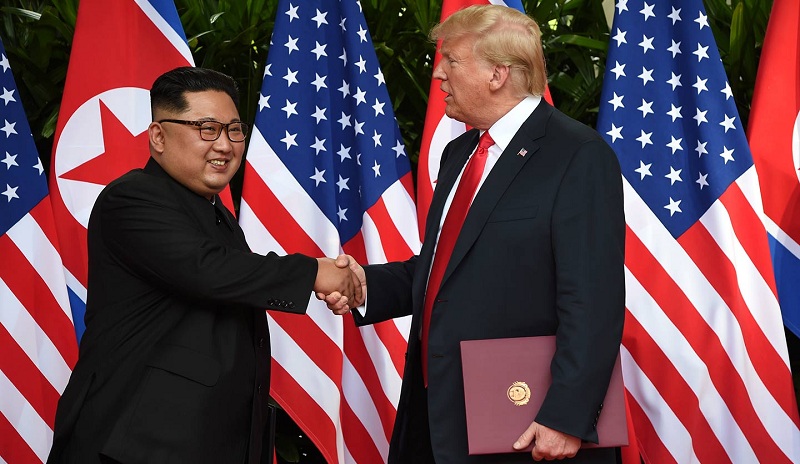Alwaght- President Donald Trump has once again called for an end to US-South Korea military exercises, saying the drills put the US in a "bad light" during talks with North Korea and are expensive.
"Holding back the 'war games' during the negotiations was my request because they are very expensive and set a bad light during a good faith negotiation," US President Donald Trump tweeted on Sunday, reaffirming his intention to suspend the annual joint US-South Korean military exercises. He also said the drills are "quite provocative."
At the same time, he pointed out that the war games would only be suspended and not scrapped entirely, giving Washington an opportunity to resume them. "[Drills] Can start up immediately if talks break down, which I hope will not happen!"
Pyongyang, which also repeatedly slammed the drills as a "provocation," is expected to welcome the move. Trump's plans, however, are viewed much less favorably by the US military and Washington's allies in the Asia-Pacific region.
The Pentagon is apparently reluctant to support the president's initiative, but is still trying to save face. Following Trump's initial announcement of his plans to suspend the drills, chief Pentagon spokeswoman Dana White told CNN that US Defense Secretary James Mattis was "consulted" on the matter and thus was "not surprised" by Trump's announcement. "The secretary is in full alignment with the president to meet his goal which is denuclearization of the peninsula," she said.
Later in the week, the Pentagon also released statements on Mattis' phone conversations with his South Korean and Japanese counterparts, which said the Pentagon chief reassured the US' allies that Washington still remains true to its "ironclad" defense commitments and alliance with Seoul and Tokyo.
The US Forces Korea command said that it had not received any "updated guidance on the execution or cessation of training exercises" and would continue its preparation for the drills scheduled to take place in the autumn.
However, according to some media reports, Pentagon officials fear the suspension of exercises could "erode" the combat readiness of the US military contingent in the region. Critics of the initiative also warn that it could reduce the effectiveness of an alliance between Washington and Seoul, Reuters reports. "It would definitely impact readiness" of both American and South Korean forces, Brian McKeon, a former senior Pentagon official, told the New York Times.
These fears are also apparently shared by Seoul. The South Korean President's Office said, following Trump's initial announcement, that it was still analyzing the US president's words. Seoul's Defense Ministry also said at that time that "there is a need to discern the exact meaning and intent of President Trump's comments."
A former South Korean military official, Moon Seong-mook, who now works as a senior analyst for the Seoul-based Korea Research Institute for National Strategy, told AP that "the American military presence in South Korea wouldn't mean much if the militaries don't practice through joint drills." Meanwhile, the Japanese media warned about the suspected growing influence of China in the region, as it reported on Sunday that Beijing was allegedly behind the idea of suspending the US drills.
Chinese President Xi Jinping reportedly urged North Korean leader Kim Jong-un during a meeting in early May to call on Washington to suspend military exercises with Seoul, Japanese Asahi Shimbun newspaper said, citing unnamed Chinese diplomatic sources.
Kim then allegedly pursued this during his meeting with Trump, the paper said, citing North Korean state news agency KCNA. The media outlet went on to say that the US-South Korean joint drills have been a "considerable concern" for China, adding that Beijing is attempting to "sway" the talks between Washington and Seoul in its own favor.
Trump's complaints about the cost of the drills were apparently also not very well received by US officials and the media. Senator Lindsey Graham (R-South Carolina) called the president's reasoning on the matter "ridiculous."
"It's not a burden onto the American taxpayer to have a forward deployed force in South Korea. It brings stability. It's a warning to China that you can't just take over the whole region. So I reject that analysis that it costs too much," he told CNN on Wednesday, adding that "the money we spend training with our allies is money well spent."
Trump blasted his critics in another tweet: "The denuclearization deal with North Korea is being praised and celebrated all over Asia. They are so happy! Over here, in our country, some people would rather see this historic deal fail than give Trump a win, even if it does save potentially millions & millions of lives!"
The total cost of the exercises – among the biggest in the world – has not yet been publicly revealed. However, CBS News calculated the flight costs for the three types of US bombers that fly between the US base in Guam and South Korea during the drills at $3,470,337, adding that it is just a "fraction" of the Pentagon's impressive $681.1 billion proposed budget for fiscal year 2019. That amount, however, is only a fraction of the total cost of the drills – something that CBS did not mention.
In 2017, the Ulchi Freedom Guardian exercise involved "approximately 17,500 total US service members… with approximately 3,000 coming from off-peninsula," the Pentagon said in a statement. According to the US media, more than 50,000 South Korean troops took part in the drills.
Ulchi Freedom Guardian is just one of the two major annual US-South Korean joint drills staged near the Korean Peninsula. The second, called Foal Eagle, is held in the spring and is also one of the world's biggest military drills.



























